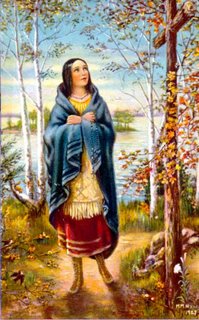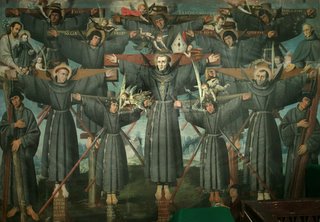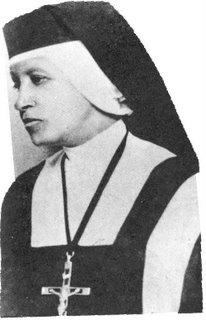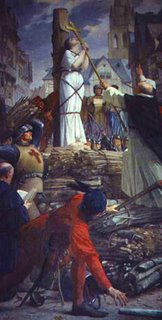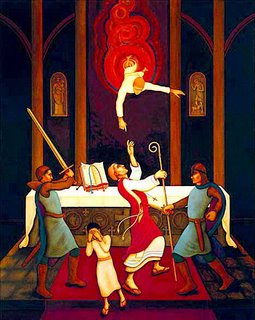
Thomas Becket during his life time would be friends of Kings and commoners alike, but always at the centre of his heart, was his Faith.
Thomas was born into a prominent family who were able to send him to the better schools of the time, this would help Thomas in later life as his career grew.
Thomas by all accounts was a very personable young man, who was outgoing and enjoyed sport and good conversation, Being that he was very able at speaking and communicating his ideas, he decided quite young to serve the Church, he then studied for a period of time at Merton Abbey before moving on and studying in France.
But upon completing his studies he returned home to bad news in that both his parents had died during his absence, this grieved Thomas as he grappled with his loss and his future. It was at this difficult time that Thomas found employment as a clerk, this would be the beginning of great things for Thomas.
While working as a clerk Thomas gained a reputation for hard work and a sense of excellence in all he undertook. This led him to be noticed and offered a job working for the Archbishop of Canterbury; Theobald was impressed with Thomas grasp of complicated issues. And while working for Archbishop Theobald, Thomas then decided on a vocation and with the permission of the Archbishop Thomas began studying Canon Law in both Italy and France. Thomas found that study suited him and his more serious side, for though Thomas was known for his easy going nature, still there was also the more contemplative aspects to this man of vision and ambition.
Upon completing his studies Thomas returned to England and was made provost of Beverley and also canon at St. Paul’s cathedral. And it was in 1154 that Thomas was ordained a Deacon whereupon Archbishop Theobald upon hearing of Thomas valuable gifts soon decided to appoint him as archdeacon of Canterbury, a high honour indeed!
Thomas was to prove himself a great credit to the Archbishop for his ability to listen and to master the art of diplomacy, in that Thomas was not only well learned he also possessed the personality to make others feel important and more learned than himself. And it was through Thomas's intervention that Pope Eugenius III did not recognise Stephen's claim to the throne but instead Henry Anjou would become King Henry II.
The King had noted Thomas's intervention and was very favourable to this man who had great skills in the very difficult field of diplomacy. And through King Henry II, Thomas was appointed as chief minister. The King came to appreciate Thomas humour and also his keen intellect, as both became friends, and admirers of each others qualities.
This friendship would prove profitable to the English people as Thomas encouraged the King to make much needed reforms when it came to protecting the rights of the poor in a court of law. For Thomas had a keen sense of justice and wished all to receive the assistance needed to overcome misfortune.
But Thomas was no ascetic as he surrounded himself with the finer things in life, and lived in some splendour. He was also able to maintain a very resplendent and palatial home with numerous servants. But this attitude suited King Henry II as he turned more and more to Thomas for companionship and high living. But Thomas did not confine his largesse to himself but shared some of his wealth with the poor and others in need of his help.
The friendship between Thomas and the King was also based on mutual respect and also at times disagreements, as both Thomas and King Henry II were free to correct one another, and did so! But beyond Thomas carefree ways also lay a man of steel, who at times hid this strength of character, but when he felt the King had done wrong, then Thomas was not above cautioning even rebuking his Sovereign!
Things were to change though when Archbishop Theobald died and King Henry II wished to replace him with his friend Thomas, as to this request, Thomas himself was unsure as he did not wish to incur the full wrath of the King. For though Thomas admired the King he was also not blind to his faults but rather he was very much aware of them and that as Archbishop of Canterbury it would be the job of Thomas to stop the Kings excesses.
But the Kings request won the day and after promptings from Cardinal Henry of Pisa, Thomas agreed to become the Archbishop of Canterbury. But Thomas still held deep misgivings for through his close friendship with the King he also knew of the Kings darker side and ferocious temper. So it came to pass that in 1162 Thomas was elected Archbishop, and later he would receive the pallium of Pope Alexander III.
Thomas would take this role seriously and so his luxurious lifestyle became a thing of the past as he practiced penances and mortifications. Thomas spent the next few years visiting the infirm, teaching Scripture and promoting the Religious life. And as Thomas gained confidence in his job he also grew in his Faith as he looked more and more to God to guide him in all his decisions.
The King at first accepted the change within his friend, but the tide would soon turn against Thomas as the King began to resent Thomas sincere Piety. This would lead to severe discord between the two as different issues were raised which brought forth an irretrievable break in their friendship.
This happened when King Henry II wished to prosecute a canon who was accused of murder, but the King wished to oppose the law of the land and instead of leaving the judgment and ruling to an ecclesiastical court, the King decided to try and take matters in his own Regal hands! This would bring the King and Thomas to a direct confrontation, as Thomas insisted that the canon had already been found not guilty of the crime. This incensed the King who felt that Thomas had opposed in a deliberate and flagrant way his own Sovereign power.
In a last ditch effort to salvage his friendship with the King Thomas as Archbishop of Canterbury crossed the channel to see the Pope, but this act would prove to be futile as the Kings rage grew by the hour and plans were already afoot to remove Thomas as Archbishop!
The King decided on a plan of humiliating Thomas by discrediting him and taking his properties from him, and though once again Thomas tried to placate the Kings fury it would prove futile, as every attempt was rejected.
But things could not go on like this and so the confrontation came to a head as the Earl of Leicester brought a message to Thomas that the King had demanded a look into his accounts so that the King himself would be sole judge of Thomas and not the Pope! Upon hearing this Thomas exclaimed, "Judgment?" "I was given the church of Canterbury free from temporal obligations. I am therefore not liable and will not plead with regard to them. Neither law nor reason allows children to judge and condemn their fathers. Wherefore I refuse the King's judgment and yours and everyone's. Under God, I will be judged by the Pope alone."
Thomas as Archbishop once again set out to see the Pope and upon explaining his position Thomas then resigned but the Pope upon consideration reinstated Thomas and sent him to a Cistercian Monastery. Upon arriving Thomas dressed in the habit of the monk's who lived there. But this was not the end as the King in his fury took out his vengeance on Thomas's relations and friends for there was no end to King Henry's II malice!
Though Thomas spent a few years in France, he was required to return to England but Thomas knew in his heart that his days were now numbered. And so Thomas once again touched the shorelines of Great Britain, and awaited his fate.
And it would be the Kings words uttered in the heat of the moment that sealed Thomas fate for once again this man of Faith stood firm against the Kings wishes to reinstate and absolve the Bishops who had supported the Kings stance against Thomas. Upon hearing of Thomas strong stand the King muttered to those near him, "What sluggards, what cowards have I brought up in my court, who care nothing for their allegiance to their lord. Who will rid me of this meddlesome priest."
It was then that a group of knights decided to murder Archbishop Thomas Becket and so they did while Thomas was celebrating Mass, these heathens hacked Thomas Becket to death by splitting his skull.
Thomas Becket found out with his life that to befriend a King was a risky business indeed, as one who came later also discovered this to be true.
Archbishop Thomas Becket died in 1170.
Saint Thomas Becket was canonized in 1173 by Pope Alexander III.
Peace of Christ to ALL
Copyright © 2006 Marie Smith. All rights reserved.
